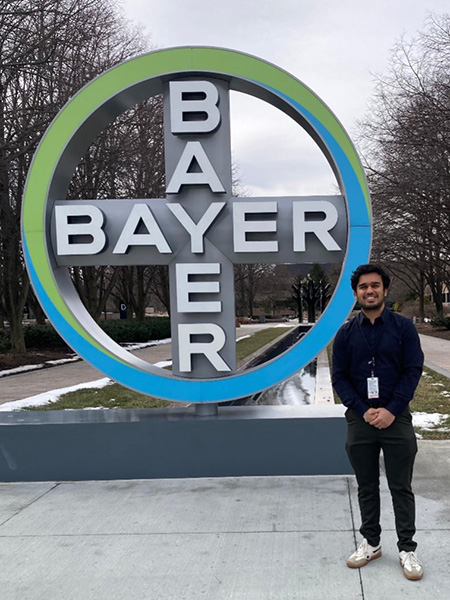Shantanu Sonawane Completes Co-op at Bayer

For Purdue Environmental and Ecological Engineering (EEE) master’s degree candidate Shantanu Sonawane, making a sustainable world impact starts with building a strong foundation.

Shantanu recently completed an Environmental Engineering Co-op at Bayer Crop Science in St. Louis.
Bayer’s mission centers on “health for all, hunger for none” with a commitment to addressing challenges to our planet’s ecosystems while driving sustainable growth.
While working with Bayer, Shantanu’s focus was on the optimization of the wastewater treatment plant at Bayer’s Muscatine manufacturing site.
“My project aimed to improve the activated carbon and sand filter performance for efficient removal of organic contaminants and total suspended solids (TSS) in a cost-effective manner,” said Shantanu.
“My responsibilities included designing and conducting lab scale experiments to simulate site filtration conditions by modeling a small-scale carbon filter system. I performed instrumentation setup, standard preparation, data analysis, interpretation using analytical techniques, and documented experimental procedures. I also presented technical findings and recommendations to plant engineers to support process improvements.”
Shantanu’s current goals, work, and mentorship as a student in the Purdue School of Sustainability Engineering and Environmental Engineering (SEE) played a significant role in making this Co-op experience a success.
“Achieving the goals I set for myself through the EEE master’s program by building a strong foundation across both traditional environmental engineering areas (air, water, and waste) and modern environmental disciplines such as sustainability and life-cycle assessment is exciting and fulfilling,” Shantanu shared.
“I was fortunate to receive exceptional mentorship from Dr. Andrew Whelton, who guided my research and included me in his group, and Dr. Nadezhda (Nadya) Zyaykina, who mentored me in laboratory work. Their support and the skills I gained from SEE played a big role in helping me get my Co-op at Bayer.”
Shantanu’s striving to work as an Environmental or Wastewater Engineer to contribute to sustainable water treatment and resilient infrastructure while pursuing his Fundamentals of Engineering (EIT) certification and Professional Engineer (PE) licensure. His work at Bayer provided him with valuable skills to make these future giant leaps.
“With Bayer, I learned how my academic and laboratory experience connects directly to full scale industrial operations and regulatory compliance,” Shantanu celebrated.
“I understood the importance of working independently while collaborating effectively within a team. I developed hands-on skills in process modeling, data interpretation, and data-driven decision making, as well as communicating results across interdisciplinary teams. The experience strengthened my ability to translate theory into practical engineering solutions…Bayer’s work culture was friendly and supportive with an emphasis on innovation. Collaborating with experienced engineers helped me understand the practical aspects of industrial wastewater engineering and how environmental sustainability fits into daily operations.”
Shantanu cited that the teamwork and collaboration that he values began in SEE.
“The SEE program is well structured yet flexible, allowing me to explore a broad range of topics in environmental and civil engineering. The program’s strong mentorship culture and support from faculty and staff—especially Michelle, who helped me plan my academic path efficiently which made a significant difference; I value the collaborative environment among students, faculty, and research groups, which encourages innovation grounded in sustainability and public health.
I am grateful for the mentors, peers, and research teams who have shaped my engineering journey. Every project from coursework to laboratory and field work—has strengthened my commitment to applying environmental responsibility through practical, real-world implementation and becoming a well-rounded environmental engineer.”
For more information about Purdue’s School of Sustainability Engineering and Environmental Engineering, please visit: https://engineering.purdue.edu/SEE.
